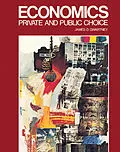Economics: Private and Public Choice is an aid for students and general readers to develop a sound economic reasoning. The book discusses several ways to economic thinking including six guideposts as follows: (i) scarce goods have costs; (ii) Decision-makers economize in their choices; (iii) Incentives are important; (iv) Decision-makers are dependent on information scarcity; (v) Economic actions can have secondary effects; and (vi) Economic thinking is scientific. The book explains the Keynesian view of money, employment, and inflation, as well as the monetarist view on the proper macropolicy, business cycle, and inflation. The book also discusses consumer decision making, the elasticity of demand, and how income influences demand. The text analyzes costs and producer decisions, the firm under pure competition, and how a competitive model functions. The book explains monopoly, and also considers the high barriers that prevent entry such as legal barriers, economies of scale, and control over important resources. The author also presents comparative economic systems such as capitalism and socialism. This book can prove useful for students and professors in economics, as well as general readers whose works are related to public service and planning in the area of economic development.
Inhalt
Suggested Outlines for One-Semester Courses
Preface
Acknowledgments
I The Economic Way of Thinking - An Introduction
1 The Economic Approach
What Is Economics About?
Man's Losing Struggle with Scarcity
The Economic Way of Thinking
Normative and Positive Economics
Looking for Action?-Try Economics
Myths of Economics: "Economics rejects the humanitarian side of man."
Perspectives in Economics: Do Material Goods Bring Happiness?
2 Some Tools of the Economist
Opportunity Cost Is the Highest Valued Opportunity Lost
The Production Possibilities Curve
Trade Tips and Comparative Advantage
Dependence, Specialization, and Exchange
Three Economizing Decisions Facing All Nations: What, How, and for Whom
Two Methods of Making Decisions-The Market and Government Planning
Myths of Economics: "In exchange, if someone gains, someone else must lose. Trading is a zero-sum game."
3 Market Decisions and the Market Process
Scarcity Necessitates Rationing
Consumer Choice and the Law of Demand
Producer's Choice and the Law of Supply
Price and Market Equilibrium
Shifts in Demand and Advice on How to Pass Your First Economics Exam
Shifts in Supply
Time and the Adjustment Process
Supply and Demand in Action
Repealing the Laws of Supply and Demand
Rationing and Motivating, the Two Great Attributes of the Market
Myths of Economics: "Rent controls are an effective method of assuring adequate housing at a price the poor can afford."
4 A Bird's-Eye View of the Public Sector
Ideal Economic Efficiency
Why Might the Invisible Hand Fail?
Government-A Potential Vehicle for Gain
Redistribution-Dividing the Economic Pie
The Market and the Public Sector-Two Methods of Economic Organization
Conflicts between Good Economics and Good Politics
Outstanding Economist: James Buchanan
5 Taxes and Government Spending
What Do Federal, State, and Local Governments Buy?
Sources of Tax Revenues
The Concept of Incidence
Who Pays the Tax Bill?
The Taxes Others Paid
Myths of Economics: "The growth of the federal government has been the major source of government expansion."
Controversies in Economics: Is There an Energy Crisis or a Policy Crisis?
II Macroeconomics
6 Taking the Nation's Economic Pulse
The Concept of the GNP
Two Ways of Measuring GNP
Gross National Product or Gross National Cost?
Five Problems with GNP as a Measuring Rod
What the GNP Does Not Measure
The Great Contribution of GNP
Other Related Income Measures
Outstanding Economist: Simon Kuznets
7 Unemployment, Inflation, and Business Cycles
Swings in the Economic Pendulum
A Hypothetical Business Cycle
Three Different Views of the Business Cycle
The Normal Rate of Unemployment
Cyclical Unemployment
Actual and Potential GNP
Questions and Answers about Inflation
Myths of Economics: "Unemployed resources would not exist if the economy were operating efficiently."
8 Aggregate Equilibrium and a Simple Keynesian Model
Keynes and the Views of Classical Economists
Tools of Modern Keynesian Analysis
Equilibrium and the Keynesian Model
Adding Government Demand
Leakages and Injections-Another Way of Looking at Equilibrium
Pulling It Together
Outstanding Economist: John Maynard Keynes
9 The Multiplier, Accelerator, and a Keynesian View of the Business Cycle
The Multiplier Principle
Business Pessimism - A Self-Fulfilling Prophecy
Investment Instability and the Accelerator
A Keynesian View of the Business Cycle
Investment and the Cycle
10 Fiscal Policy
Public Policy to Deal with a Recession
Fiscal Policy to Deal with Inflation
The Central Idea of Fiscal Policy
The Full-Employment Budget Concept
Has Real World Fiscal Policy Been Stabilizing?
Automatic Stabilizers
Spending versus Taxing Alternatives
Outstanding Economist: Walter Heller
Perspectives in Economics: Fact and Fiction about the National Debt
11 Money and the Banking System
What Is Money?
The Business of Banking
Fractional Reserve Goldsmithing
Fractional Reserve Banking
The Federal Reserve System
How the Fed Controls Our Money Supply
The Fed and the Treasury
Dynamics of Monetary Policy
Outstanding Economist: Arthur Burns
12 Money, Employment, Inflation, and a More Complete Keynesian Model
The Demand and Supply of Money
Interest Rates and Investment
Expansionary and Restrictive Monetary Policy
How Monetary Policy Works - The Keynesian View
Combining Monetary and Fiscal Policy
Did Macropolicy Cause the Inflation of the 1970s?
Will Monetary Policy Always Stimulate Demand?
Full Employment and Inflation in the Real World
Outstanding Economist: Paul Samuelson
Controversies in Economics: Will There Ever Be Another Great Depression?
13 The Business Cycle and Inflation-The Monetarist View
The Equation of Exchange
The Classical View-Money Does Not Matter
The Early Keynesians-Money Still Does Not Matter Much
The Modern Monetarist-Money Matters Most
The Impact of Money-The Monetarist View
Money and Business Cycles
Money, Recessions, and Inflation-The Record
Money and Inflation in Other Countries
Outstanding Economist: Milton Friedman
Myths of Economics: "Inflation is caused by greedy businessmen and union leaders."
Perspectives in Economics: Inflation: Its Cause and Cure-A Monetarist's View
14 Proper Macropolicy-The Monetarist View
Two Things That Monetary Policy Cannot Do-The Monetarist View
Limited Effectiveness of Monetary Policy-The Monetarist View
Three Things Monetary Policy Can Do-The Monetarist View
Why Macroplanners May Do the Wrong Thing
Constant Rate of Monetary Growth-The Monetarist View of Proper Policy
The Monetarist …
